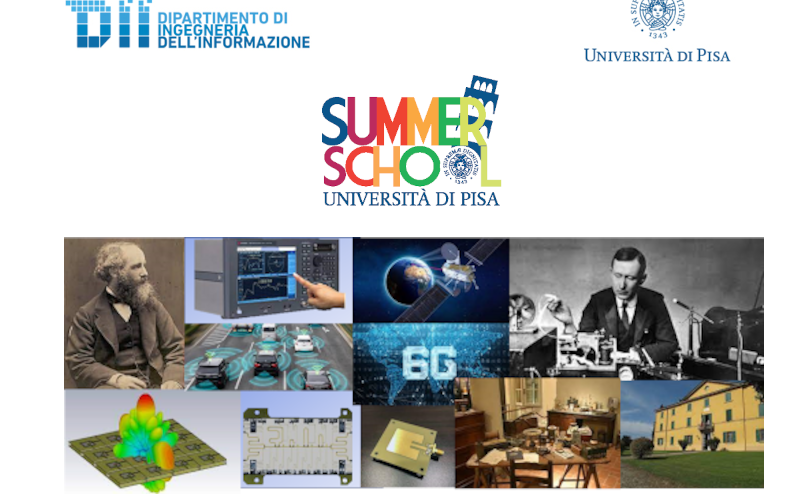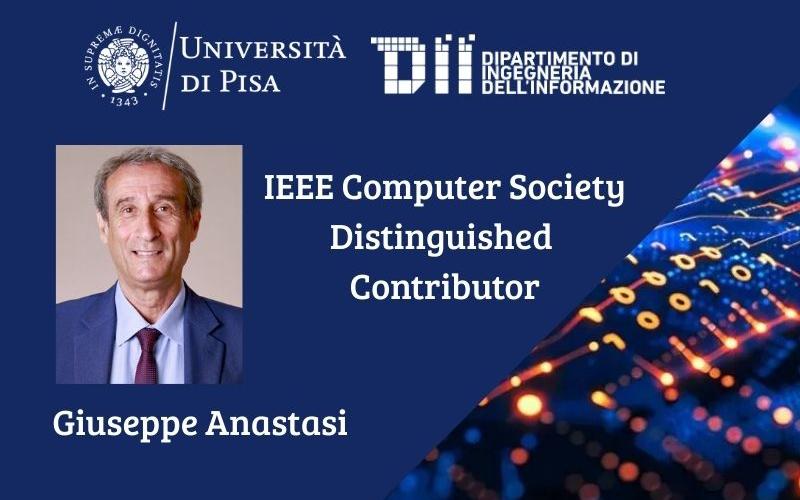La nomina a Distinguished Contributor (DC) premia i membri e gli affiliati della Computer Society che hanno apportato contributi tecnici significativi e continuativi alla IEEE Computer Society, alla...
Leggi tuttoMicrowaves and mm-waves for the Design of Advanced Wireless Links: Communication, Sensing and Power Transfer


The Summer School offers 6 ECTS credits through the delivering of 48-hour lectures. Attendees will get an introduction to EM fundamentals and then will learn how those are applied to the design and implementation of advanced communication systems, radars, wireless sensing systems, wireless networks and high-frequency circuits.
The Summer School lectures are subdivided into two parts. The first part is devoted to a concise and basic description of the most important EM phenomena: wave propagation in free space and guiding structures; properties and characteristic parameters of passive devices, transceivers and antennas. Experimental measurements and introduction to commercial EM solvers are also planned. The second part of the lecturers is devoted to highlight how the EM phenomena and devices previously reviewed are applied in some of the most advanced wireless systems.
Lecturers, from both academia and ICT industry, will focus on the design criteria, technical features, architectures and innovative aspects directly induced by EM concepts in non-terrestrial networks, 5G mobile communications, wireless power transfer systems, V2X communications, satellite communication networks, microwave systems for aerospace and defense. To fully pursue the Summer School goals and provide the most effective outcome, lecturers are selected among academia (University of Pisa and University of Bologna), ICT industry and international research centers.
On Tuesday June 17th, all the University facilities in Pisa are closed due to the celebrations for the patron saint of the city of Pisa, San Ranieri; on that day, the lectures will be given at the Marconi’s Museum in Villa Griffone, Pontecchio Marconi (close to Bologna). In the morning, the attendees will have a guided tour of the museum and the chance to see some experiments emulating those made by the pioneer of the radio communications (Nobel Prize for Physics, in 1909) in his family country estate in the late XIX century. In the afternoon, lecturers on WPT (wireless power transfer) systems and RIS (Reconfigurable Intelligent Surfaces) for 6G mobile communications will be given by recognized experts from the University of Bologna. The bus transfer for the round trip to Pontecchio Marconi, as well as a class-building lunch, will be provided by the Summer School organizers.
All participants, both those participating in person and those participating remotely, will receive a certificate of attendance. It is worth noting that those students interested to earn the 6 ECTS credits are expected to agree with the Summer School coordinators on a Project Work topic and then submit their final report no later than 30 August 2025 (pdf submission by email to paolo.nepa@unipi.it and andrea.michel@unipi.it). The approved project works will receive a grade, and after a few days the students could download a transcript-of-records directly from their student account at the University of Pisa. Master students and PhD students could spend the gained 6 ECTS credits at their home institution (based on credit recognition rules applied at their Bachelor/Master Degree course or PhD program).
School Syllabus
Part I: Basic remarks on EM phenomena and devices
-
Free-space propagation, ray-based propagation models
-
Wave propagation through dielectric media, multipath models
-
Wave propagation in guiding structures, printed lines
-
Passive devices for advanced wireless systems: characterization and design criteria. Power dividers, directional couplers, filters
-
Antennas for high-frequency wireless links
-
Transceivers: modeling and design examples
-
EM solvers for the analysis and design of devices and antennas
-
Instrumentation for the characterization of wireless network devices
Part II: Microwaves and mm-waves for advanced wireless links
-
Non-terrestrial communication networks
-
The evolution of terrestrial communication networks toward the fifth generation (5G)
-
Wireless sensing and communications in automotive V2X scenarios
-
Devices and architectures of systems for wireless power transfer and energy harvesting
-
Joint Localization and Communication with Reconfigurable Intelligent Surfaces (RIS)
-
Microwaves systems for satellite broadband networks, aerospace and defense
[Historical corner]
-
“Guglielmo Marconi, the first Italian to be awarded with a Nobel Prize for Physics (1909), in recognition to his contribution to radio communications”: visit to the Marconi Museum in Pontecchio Marconi (nearby Bologna)
Lessons will be held at the Department of Information Engineering, Via G. Caruso, n.16, Pisa, Italy (meeting room at ground floor).
The program will be activated also in distance learning mode (TEAMS platform).
Aim
The second edition of the Summer School ”Microwaves and mm-waves for the design of advanced wireless links: communication, sensing and power transfer” aims to introduce the attendees to the building blocks required to understand the basic principles, the implementation strategies and the design criteria of the most common wireless systems operating in the microwaves and mm-waves frequency bands.
An overview of the fundamental electromagnetic (EM) phenomena will be provided and exploited, to describe the most important high-frequency devices of the wireless system physical layer.
The Summer School will support the gain of skills useful to control the wave propagation and shape the EM fields, thus helping the attendees to face the challenging and ever-evolving specifications of advanced wireless systems.
The Summer School can be of interest for students (PhD students, postgraduate students, and undergraduate students who are close to getting their degree), practitioners and industry employees, who are involved in any Information and Communication Technology (ICT) fields and aim to exploit the EM phenomena to shape future communication systems, radars, wireless sensing systems, wireless networks and high-frequency circuits.
Lecture contents do not require a solid background in electromagnetics, yet experimental measurements and commercial simulation tools will be used to validate EM basic concepts, as an effective alternative to conventional approaches based only on analytical derivations.
Who can apply
PhD students, postgraduate students, undergraduate students who are close to getting their degree, practitioners and industry employees, who are involved in any Information and Communication Technology (ICT) fields and, more generally, in STEM disciplines.
Language: English
ECTS: 6
Master students and PhD students could spend the gained 6 ECTS credits at their home institution (based on credit recognition rules applied at their Bachelor/Master Degree course or PhD program).
Fees: 250 euro
Fundings
Six tuition-fee waivers have been assigned for international students; two of them were offered by the University of Pisa, and four additional tuition-fee waivers were made available by the Department of Information Engineering thanks to a liberal donation from the company Sensor ID srl, Campobasso, Italy.
Priority has been given to women for gender balance and to students with special needs coming from developing countries.
Application
IMPORTANT NOTICE:
-
The maximum number of participants is set to 50 students
Required Documents
-
Identity Document (*PASSPORT in case you are a foreign student*)
-
Enrolment Form
-
Curriculum Vitae
All the documents must be in pdf format, in order to upload them on the portal when required.
Application has to be submitted via Alice portal following the instructions of the "How to apply" page
Further details on the application procedure at microwaves-mm-waves-design-advanced-wireless-links
IMPORTANT INFO AND DEADLINES
The six tuition-fee waivers have been assigned and notified, but there is still time to apply for the Summer School until May 15, 2025.
-
April 15, 2025: application deadline for students interested to participate to the selection procedure for the assignment of six tuition-fee waivers -
April 20, 2025: the selection procedure for the assignment of the tuition-fee waivers will be concluded and the results will be notified to the awardees -
April 21, 2025: opening of the portal for tuition-fee payment
-
May 15, 2025: general application deadline for all candidates
-
May 31, 2025: tuition-fee payment deadline
Infomation about the payment method will be published in the coming weeks at microwaves-mm-waves-design-advanced-wireless-links
REFUND POLICY:There will be no refund of paid tuition fees
Contacts
Coordinator
Prof. Paolo Nepa paolo.nepa@unipi.it
Prof. Andrea Michel andrea.michel@unipi.it
Dr. Francesca Tiani francesca.tiani@unipi.it
Summer/Winter School Office support.summerschool@unipi.it
Previous Editions
| Allegato | Dimensione |
|---|---|
| 932.94 KB |



